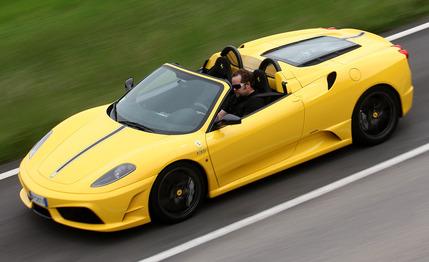
 First Drive Review
First Drive Review
Sixteen is a perfect square, in terms of integers. It’s the age you can get a driver’s license. The number of ounces in a pint. Joe Montana’s number. The fourth number in the ominous sequence from Lost . Or, to a Ferrari Formula 1 fan, it is the number of constructors’ championships the manufacturer has won since the award was created for the 1958 season.
An Open-Top Tribute
To celebrate the 16th championship, which it won last year, Ferrari built the 430 Scuderia Spider 16M, an F430 droptop with all the go-fast parts of the 430 Scuderia. Those bits include a higher-compression version of the 4.3-liter V-8 making 503 hp and 347 lb-ft of torque (80 percent of which is available at 3000 rpm), a race-tuned suspension, serving-dish-sized carbon-ceramic brakes, and the F1-Superfast2 automated manual transmission that enacts a one-two shift in 60 milliseconds. Just as in the 430 Scuderia, the interior is stripped of all comfort features. Carbon fiber and aluminum line the cabin. There is no carpet, just diamond-plate-style aluminum on the floor, accented by exposed welds. The carbon-framed seats are covered in weight-saving cloth and offer only manual fore-and-aft and seatback-angle adjustments. The doors are skinned with carbon fiber as well. The only concession to luxury lives in the dash: a horizontally docked iPod touch, the sound from which is delivered to occupants via six speakers (yup, there’s a sound system on a track-ready Ferrari). But it’s a miracle you can even hear the thing, because this is quite possibly the loudest roadgoing car we have ever driven. With the engine going full tilt, there is nothing but a visceral high-pitched scream, a sound that practically begs the driver to flog the car a little more. But be warned: After just one wide-open-throttle run through the first three gears, we quickly had the polizia in hot pursuit.
According to Ferrari, the 430 Scuderia Spider 16M is faster around the Fiorano test circuit than any open-top road car it has ever built—and we believe it. The 16M weighs in around 3300 pounds, about 200 fewer pounds than an F430 Spider, or just over 200 more pounds than a 430 Scuderia. And despite having 30 percent less torsional rigidity by the numbers, the 16M feels as rigid as any other prancing horse. It sits 0.7 inch lower than an F430 Spider.
Take Pole Position on Your Sunday Drive
Weekend drivers will rejoice on finding the button in the center console that relaxes the adjustable shock absorbers. This button is especially handy when the steering-wheel-mounted manettino—the single switch that adjusts the stability control, shift speeds, and shock damping—is set to “Race” or one of the two more extreme settings.
The 16M devoured the switchbacks coursing through the hills surrounding Ferrari’s Maranello factory. The chassis is never unsettled in transition, managing quick shifts in weight effectively, and it seemingly enjoys being pushed to the limit and driven as deep as possible into mountain hairpins. A typical problem with a car so capable never lies in the engineering but in the hands of the driver—driving an exotic near the limit on a country road, especially when you don’t own the vehicle, isn’t the stress reliever a Sunday drive might be. But this car is confidence inspiring, a trait it shares with the rest of the Scuderia’s mid-engined lineup, and it’s what makes these cars so attractive. It’s also a large part of why the F430, in any form, has never lost a C/D comparison test.
We have yet to run numbers on the 16M Scuderia Spider, or a fixed-roof 430 Scuderia for that matter, but our guess is that the Spider would break 60 mph in 3.4 seconds and the coupe would be a hair quicker. Assisting the Scuderia and 16M in flat-out acceleration is the adoption of launch control—a feature previously omitted from U.S.-bound F430s. The Ferrari California also features launch control, but it uses Ferrari’s first dual-clutch automated manual gearbox. We tried the launch control, and it proved to be significantly different from what we are used to. Usually, when a launch control program is selected and the appropriate protocol is performed, the engine will rev to a predetermined rpm and stay there before dumping the clutch. In the 16M, however, the driver needs to manage rpm while keeping his left foot on the brake. So if you want to do a first-gear burnout, no problem, just keep the tach pegged at the 8500-rpm redline and release the brake.
Rarefied Company
The Lamborghini Gallardo LP560-4 Spyder (yes, it’s Sp yder for Lambo, Sp ider for Ferrari) is built just 20 miles up the road, in Sant’Agata Bolognese, and it’s the chief competitor to the 16M. In coupe guise, the Lambo is ridiculously quick, hitting 60 mph in 3.2 seconds and ticking off a quarter-mile in 11.2 seconds at 130 mph. The Spyder version will probably be a 10th or two slower than that. The Lambo might win in a drag race or perhaps a beauty competition, but the 16M dominates the Lambo in chassis performance. We will have to wait for a head-to-head showdown, but our initial gut feeling is that the Ferrari will remain undefeated, and undisputed.
Did we mention the 16M is limited to 499 examples and deliveries have already started? Or that to get your hands on one, you’ll have to part with $313,350? So open that checkbook right now if you want this car—and don’t think you can wait around a year to be first in line for the 17M. Through the fifth race of the 2009 F1 season, Ferrari’s chances for a 17th title aren’t looking good, as the team has no victories and is 62 points behind leader Brawn-Mercedes.